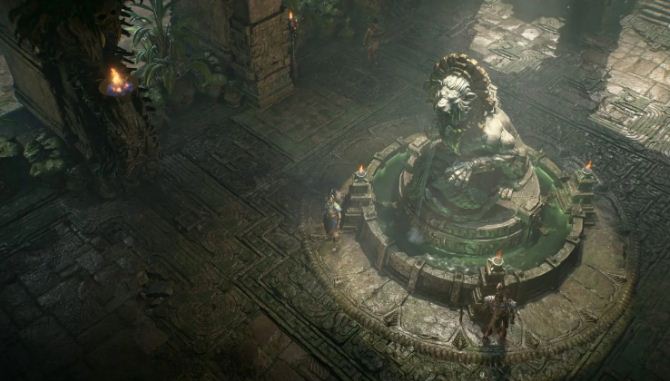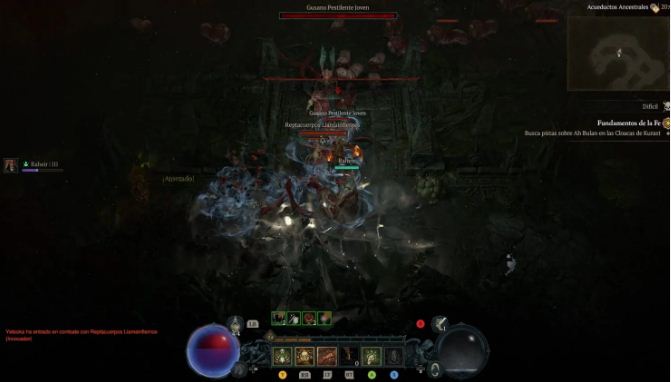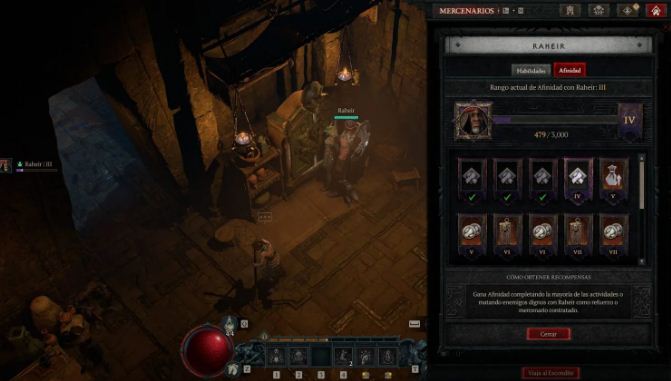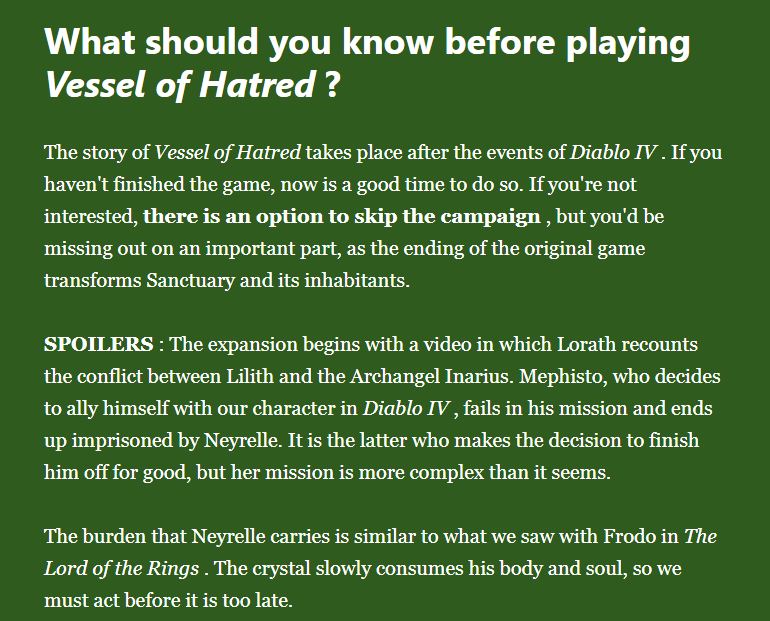Diablo IV is back with its new expansion, Vessel of Hatred, which aims to win over fans of the action RPG. More than a year after the original game launched, Blizzard has made significant changes over five seasons. While this approach has kept the game fresh, an expansion is essential for introducing new mechanics, classes, and a story mode that continues the plot.
Please follow us on Facebook and Twitter.
Vessel of Hatred represents the culmination of a rollercoaster journey for Diablo IV. After a successful launch, Blizzard lost the trust of players due to unnecessary changes. The developers promised improvements, and it wasn’t until Season 4 (Loot Reborn) that they delivered a game with renewed mechanics that completely revamped the item system.

The new expansion builds on these foundations and includes exciting additions, such as a new class, a mercenary system inspired by Diablo III, and new dungeons and areas for leveling up and obtaining equipment. At Thetechbasic, we had the chance to play the final version of Vessel of Hatred for many hours, and we conclude that it has all the elements to become a success.
The Spiritualist is the most flexible class in Diablo for a long time.
The main new addition in Vessel of Hatred is the Spiritualist class, which combines elements of both the Druid and Barbarian classes. This class uses four animal spirits to enhance their attacks, allowing players to mix and match skills to create a playstyle that fits them.
The expansion keeps the same skill tree system as Diablo IV, where players unlock attacks by adding points as they level up. Vessel of Hatred does not limit the ability to change skills, though there is a small fee for doing so. This feature lets players experiment with different combinations of attacks and defensive moves from the four spirits until they find the setup that works best for them.
Another feature of the Spiritualist is the Spirit Hall, a mechanic that allows you to choose one spirit as a Guardian and another as Support. This feature adds passive abilities to your character, boosting either their attack or defense based on the selected spirit. The Guardian also plays a role with the Blacksmith, as it enables you to add bonuses when forging weapons or armor.
After spending hundreds of hours with a Barbarian in Diablo IV, switching to the Spiritualist has been a delightful experience. This new class provides the speed needed to move and dodge attacks without sacrificing power. While Diablo has always offered options for various player styles, the Spiritualist is particularly flexible, allowing you to adapt it to your preferences quickly without needing to start a new character from scratch.
More enemies and a group of mercenaries to finish them off
With the Spiritualist comes Nahantu, a new region located south of Sanctuary that offers a vibrant change from the red and brown hues of Diablo IV. This jungle is home to the Spiritualists and is filled with lush trees, waterfalls, and ruins inspired by Mexica and Mayan civilizations. The armor showcases jade and gold, creating an attractive contrast, while the cities are rich with references that southern Mexican inhabitants will recognize.
In terms of gameplay, Nahantu introduces new enemies that can be quite challenging if you don’t learn how to deal with them. In this way, Vessel of Hatred feels much more aggressive than Diablo IV, with hordes of enemies that rival the numbers seen in the final acts of Diablo III.


Ambushes during timed events or dungeon bosses are incredibly adrenaline-pumping on higher difficulties, making victories feel truly rewarding. The good news is that Vessel of Hatred includes a helpful option to aid you in your adventure: Mercenaries. This mechanic from Diablo III returns in the expansion, allowing you to recruit one of four mercenaries, each with unique abilities.
Mercenaries level up and earn points that can be used to unlock skills. As they fight alongside you, they also build affinity with the player, which unlocks various bonuses. The only downside is that you can only have one mercenary active at a time, although you can briefly summon another when launching an attack.
Generally speaking, Mercenaries are helpful as support partners or distractions for enemies. Their attacks may not match your damage output or that of another player in co-op mode, and they rarely change the outcome of a battle. However, they provide a level of customization that allows you to synchronize attacks for greater damage.
In the new Diablo IV expansion, every detail matters.
If you’re not interested in the Spiritualist and prefer to continue your adventure with another character, Vessel of Hatred offers some exciting new features. Diablo IV’s classes now have new abilities, but the most intriguing addition is the rune words mechanic. This allows you to access abilities from other classes by combining runes that you insert into your items.

Runewords consist of a ritual rune and a summoning rune, which you can collect throughout your journey. The ritual rune specifies the movement needed to activate it, while the summoning rune adds the bonus. This combination can be applied to items with two sockets, but there is a limit to how many runewords you can carry at once.
Unlike other titles, Diablo IV feels like a kind of LEGO, made up of blocks that provide benefits to the player. Runes, legendary items, the use of jewels, and the Hall of Spirits all contribute to gameplay, making their management crucial for those exploring beyond the main story.
As you delve deeper into the underground city of Kurast or the Dark Keep (the co-op experience), you’ll discover that utilizing every available resource is essential for success.
Is Vessel of Hatred worth it ?
After dozens of hours spent in Vessel of Hatred, I can confidently say that the new expansion is worth the investment. The Spiritualist class is flexible enough to make starting over in Diablo IV enjoyable, and the gameplay additions provide enough value to justify the purchase. The campaign is solid, addressing some lingering questions, though it may not be as extensive as the original game.
Reviewing Diablo IV is similar to reviewing an MMOG. Vessel of Hatred will evolve with the seasons, and there’s no guarantee that Blizzard won’t implement game-breaking changes. However, the good news is that the studio has learned from past mistakes and has delivered two flawless seasons, so we hope they continue this positive trend. Diablo IV: Vessel of Hatred is available as of October 8 on PC, Mac, PS4, PS5, Xbox One, and Xbox Series X|S. This review is based on the Battle.net PC version.





